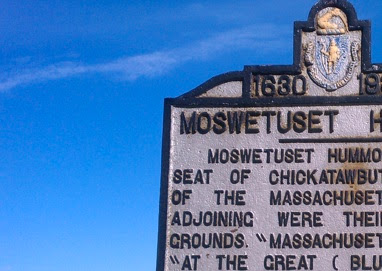Early last month I posted a short piece on a class website project that my students and I did as part of a fall history readings/methods course. We created a resource website for the Moswetuset Hummock, a historic outcropping of land
 near our college, which played an important role in the first encounters between Indians and English settlers. If nothing else, the effort inspired students to get out of the classroom and do history.
near our college, which played an important role in the first encounters between Indians and English settlers. If nothing else, the effort inspired students to get out of the classroom and do history.The students and I had no idea that the website would garner the attention of our local Quincy newspaper. And we certainly didn't imagine that the project would draw the attention of the Boston Globe. But . . . it did. And we're thrilled to get that kind of attention!
Jessica Bartlett reports on our efforts and what we hoped to achieve. ("Eastern Nazarene College students create website on Quincy's Moswetuset Hummock," Boston Globe, January 25, 2012.)
Although the small section of Quincy known as Moswetuset Hummock is where Massachusetts derived its name, relatively few know the significance of the small marsh located on Quincy Bay.
Students from Eastern Nazarene College are hoping to change that. 
The small, wooded area that separates Quincy Bay from the Neponset River received recent exposure with the help of six ENC students and History Professor Randall Stephens, who created a website dedicated to exploring the significance of the shore and detailing its place in history.
Part class history project, part exploratory jaunt through time, the website includes information on the Indians that lived in the area, to the relations with new settlers, to the diseases that would decimate the tribes by the time Myles Standish meet the tribe leader in 1621. >>> read on






1 comment:
Some healthy skepticism from historian Jeremy Bangs:
I'm not sure about identifying "Moswetuset" as the source of "Massachusetts." I think that certainty will remain elusive. Because of 17th-century freedom of spelling and the difficulties of writing an equivalent in English of sounds that almost certainly did not correspond easily with what had become identifiable and recognizable in the English of the time (being written down by people whose competence in writing ordinary English also varied from one writer to the next), there's a wide range of spellings of Indian place names. As for "Massachusetts," there are some other possibilities than "Moswetuset." This is from pp. 60-62 of my publication of the land documents of transfer from Indian to colony ownership: Indian Deeds, Land Transactions in Plymouth Colony 1620-1691 (NEHGS, 2002, slightly revised and improved in paperback edition 2008). (I have omitted the footnotes here.)
"The records of Duxbury refer to the area that became Middleborough, using the spellings Namassakeiset, Mattakiset, Mattikeset, Namassakieset, Namassakeeset, Namassakeesit, Matakiset, Matakesit, Namassokeiset, Mamasakesit, Mattacheesit, Matakeesit, and Mattakesit. These and other references show that whatever consonent sound the Indians were making, the English had difficulty distinguishing between a double s and a double t ; furthermore, the k and the ch are interchangeable, suggesting a likely gutteral version of the ch sound. Vowels are also variable, with e, ee, ei, ie, and i interchangeable, sometimes with u as well. Another possible spelling would be Mattachusett or Massachusett, or Namassachusett, as in deed nr. 37. The natives led by Josias Chickatabut alias Wampatuck of Mattakeeset are the Massachusetts. Chickatabut's residence at Mattakeeset was identified by Aaron Hobart in 1839 as being "near the Indian Ponds, in Pembroke." Adding to the potential for geographic confusion is the use of the same name to refer to land at Barnstable and Yarmouth, also known as Mattakeeset or Mattachese. If "Mattacheese" meant "old fields," as local historians of Yarmouth and Barnstable have claimed, the word could be used appropriately for more than one place. There is also a place called Mattachesett Fields in Harwich. A history of Barnstable states, moreover, that "The Indians who inhabited the region were called Mattakees, or the Mattakeset tribe." Middleborough, although sometimes called Mattacheesit, was known under the form Nemasket, and a local history begins with the comment that, "When the pilgrims landed at Plymouth in 1620, Middleboro was occupied by the Namasket Indians." "Nemasket "is explained as probably combining "Nemah" (meaning "a fish") and the ending "et" (meanting "the place of"). Reference is said to be to an Indian fish weir."
Post a Comment